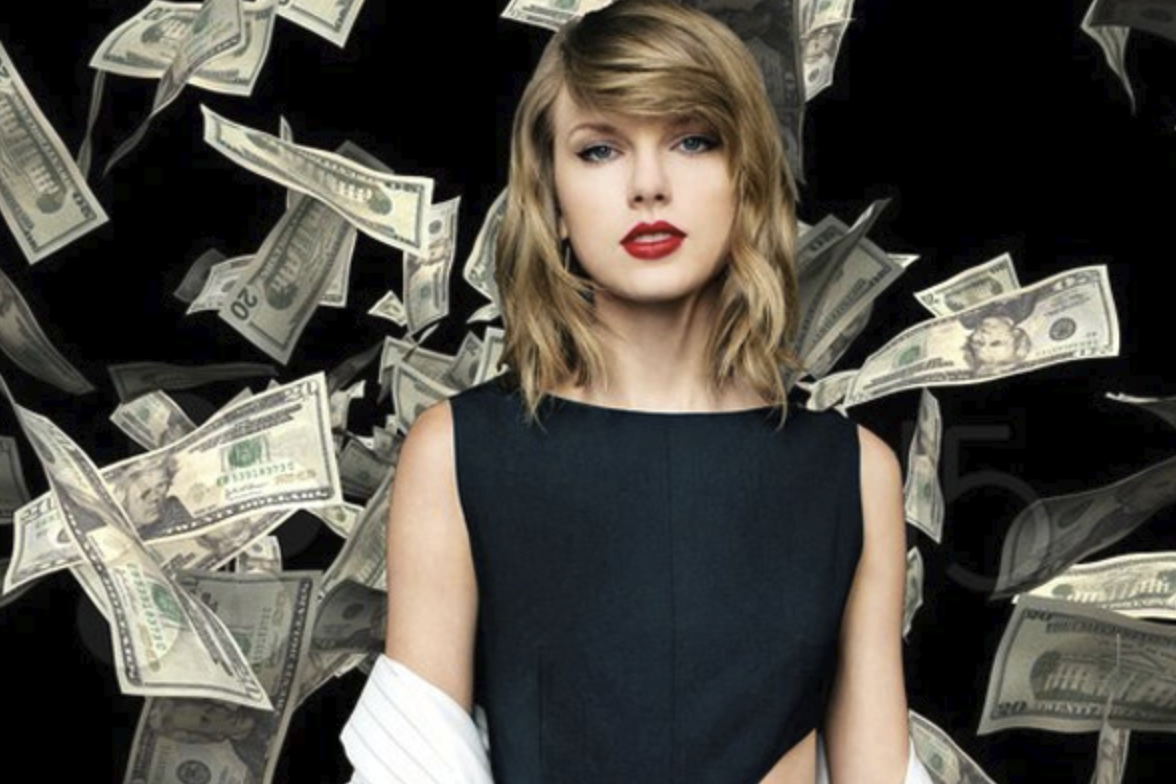Why I Subscribed To Eve 6's Patreon
The title might sound a little click bait-y, but I promise it’s not. I wanted you to click, of course - and here you are! - but I didn’t set out any bait, or, if I did, it’s at least delicious bait and not misleading bait when you compare it to the actual meat of the article. I really did the thing I said I did in the title (subscribed to Eve 6’s Patreon), and I did it for pretty straightforward reasons that I plan to describe for you (interested, musically inclined, potentially nonplussed reader) below. Tonight, I feel ambitious.
Before we get into that, though, let’s spend a minute beating around the bush at the macro level. As of October 2024, the music industry is in a pretty weird (some might say “dire”) place: if you’re Taylor Swift, you’re raking in prodigious sums of money from virtually every direction - streams, touring, merch, partnerships - but if you’re not Taylor Swift, and I’m guessing you’re probably not (but if you are, what’s up Tay? Wanna collab? Get coffee? Whatever you want is probably fine), you are likely having a significantly tougher time staying afloat. If you’re me (I’m guessing you’re probably also not me, but if you are me, yikes - have your people call my people), you’re so deep in the red with your musical output that the concept of “making a living” as a musician makes you scoff in a really sad, jaded way because of how flat-out ridiculous it seems.
Can You Make Money As A Professional Musician?
Within the wide gulf between me and Taylor Swift live the artists who do this thing for a living and who, while technically in the black, aren’t exactly spending their weekends swan diving into vaults of gold coins. They’re the ones who regularly release new music and tour relentlessly, and many of them are household names; if you were to check their Spotify stats, you’d probably find streaming counts reaching up into the six- or seven-figure range. Having a million-plus streams probably sounds like an unequivocal positive, and to be sure, it is that, but it’s also not quite as lucrative as you might think: based on the Spotify’s current payout structure (artists collect approximately $0.005 cents per stream, if you’re wondering), one million streams actually only comes out to about five thousand bucks.
Now, five thousand bucks ain’t nothin’, but according to a recent CNBC article incorporating data from MIT’s Living Wage Calculator, the median salary required in order to “live comfortably” as a single person in 2024 is $89,461. If you have the back of a napkin handy and feel inclined to do the math, you’ll find that a “Comfortable Living” stemming from Spotify payouts alone can only be enjoyed by those musicians fortunate enough to generate eighteen million streams per year. Clearly, such a feat can be accomplished - there are plenty of examples, including the bands in the “widely known but also not the Rolling Stones” category I mentioned before - but take it from someone who has tried repeatedly and come up way short: pulling even one million streams is no joke.
What’s Eve 6 Got To Do With Anything?
With that groundwork laid, let’s introduce our main character.
Eve 6, of course, wrote the heart-in-a-blender song, and, given that you’re the kind of person who reads an article like this one, you may not be surprised to learn (or you may already know!) that “Inside Out” currently has a lifetime stream count north of 192,000,000; that banger crossed the one million mark a long time ago. Despite what might be indicated by the sophisticated calculations I performed a few paragraphs up, I’m no mathematician, and so I won’t try to parse the band’s financials based on streaming numbers alone, but my guess is that it receives a regular royalty check for a pleasant-but-not-life-altering sum generated largely by streams of earworms - including “Inside Out” and “Here’s to the Night” - that, as of 2024, are well over two decades old. Passive income is a wonderful thing, but it’s also worth pointing out that, as is the case with many bands, a) Eve 6 is comprised of multiple members, and b) its biggest songs are almost definitely tied up in label deals and hamstrung by royalty obligations; both of those characteristics reduce the individual take-home amount a particular song might generate, whether through streaming or otherwise.
In other words, Eve 6’s hits of yesteryear do bring home some bacon, but it probably ain’t a whole lot once everybody with a fork takes a bite.
No, But Seriously…Why Are We Talking About Eve 6?
Here’s the other thing: Eve 6 has released a ton of music over the course of the years following that early boom era, and it kicks so, so much ass. Yep: this is the part where I reveal myself to be an Eve 6 turbo-listener, a dyed-in-the-wool fanboy, and yes, I totally realize that my fanship alone basically answers the question in the article title, but I promise there’s more to it than that, and I promise that I’ve got a bigger point to make here about the industry at large - not just how much I love Eve 6 (although I’ve lately realized that I may love them more than most people) - and I promise not to try not to let you down.
There’s no gripping origin story here: I got into Eve 6 when everyone else did. I heard “Inside Out” on the radio whilst silent riding shotgun in my parents’ car at age thirteen, and the second I did, some loose collection of Tetris pieces that had been tumbling around my brain cavity snapped together and I knew: this was my shit. So I saved up some allowance, and I bought the CD, and it was awesome. At the time, I was learning how to play my new acoustic guitar, and while it hadn’t occurred to me yet that I could write songs of my own (I’d come to that realization a few years later and pen a slew of songs so profoundly embarrassing in their earnestness that my ears burn to even think about them now), Max Collins’ particular approach to songwriting struck a (power) chord with me and ultimately informed my own process to such a degree that I probably owe him either an apology or royalties. Maybe both.
In 2000, Eve 6 released its sophomore album Horrorscope, so I saved up some more allowance and bought the CD, and again, it was awesome. When I went off to college in 2003, I forged some of my closest friendships there with the blowtorch we each carried for the bridge of the album’s lead-off hitter, “Rescue.” Nobody - nobody - does a bridge or an outro like Eve 6. This guy knows what I’m talking about. The last minute or so of “Bang” still makes me break into a literal sweat, and don’t even get me started on “Think Twice”, where, for the song’s big finish, the band inverts the pre-chorus and chorus so that the pre-chorus, a slow-burn appetizer during its first two repetitions, morphs smoothly - almost imperceptibly, somehow - into a gigantic, shout-along main course.
You get the picture. I don’t need to sell you on my love for Eve 6. I don’t need to tell you about the horns at the end of “B.F.G.F.”, a song from the band’s criminally underappreciated 2012 album Speak In Code that I listened to almost daily during a year I spent in near-solitude clerking for a judge in a small Georgia city, and it probably doesn’t matter to you that, based on what I can gather from some low-quality bootleg MP3s in my iTunes library, Eve 6 reappropriated that song’s verses from “Can of Worms,” a song released by Max’s solo band, the roundly ignored and short-lived Max Collins and the Brotherhood of Lost Dogs.
We can move on.
Who Am I, And What Do I Know About Spotify?
Who, exactly, am I? Well, I’m a musician, a fan of music, and a fan of supporting musicians. I’m also a lawyer, which is what it is, I guess (“Gotta make a livin’!”, etc.), but I spend a healthy percentage of my non-lawyering time creating and attempting to market my own music, and I have deduced, after years of trying and failing to find a foothold in the industry, that finding a foothold in the industry is, uh, really hard. The problem is that without a foothold, you can’t reach the money, and if Spotify represents any kind of foothold at all, it’s so low to the ground that it might as well not exist.
That’s not necessarily to say that consumers shouldn’t use Spotify, although there’s a compelling argument to be made there, but rather that there are a handful of low-cost options that can provide significant returns to artists when participation reaches a critical mass. Some of those options are fairly obvious: vinyl sales have been growing for seventeen years straight, and chances are your favorite band has records available for purchase on its website. To buy one of those records is to stuff a fat wad of cash directly into that band’s pocket, and that wad represents a sum way higher than the band would bring in from you streaming its album a few times.
That said, vinyl remains something of a luxury item. Even more so than the CDs that propped up the 90s scene, vinyl sure ain’t cheap: with tax and shipping included, ordering a record online can easily run you more than forty bucks. How, then, to direct a more reasonable sum of money around the toothy maw of the Spotify machine? Without dropping nearly half a Benjamin on a record, how can you funnel cash to your favorite artist without giving Spotify the opportunity to subdivide it and dilute it and infinitely carve it up into fractions of fractions of pennies?
The Patreon Model
I’m no shill for Patreon - I currently subscribe to exactly one account, and you already know which one it is - but I do find the platform intriguing, particularly in how decisively it seems to reject the streaming model. From a certain angle, Patreon looks like a platform for hosting fan clubs - right now, it caters mostly to the superfans - but from another perspective, what with the way it gates access to exclusive content (ranging, admittedly, from the desirable to the dubious), what Patreon more closely resembles is a platform from an adjacent part of the media landscape: Substack. Like musicians, journalists have been forced to get resourceful to squeeze any real money out of the systems that have a chokehold on their profession, and so they’ve begun using Substack to lock up their output behind monthly subscriptions. At its core, that’s what Patreon is too: a customizable paywall for musicians.
In the case of Eve 6, after putting out hyper relevisation - a punk-informed, blistering meteor of a record that was a curveball to those of us raised on the band’s power-pop leanings - in 2022, the band made a (maybe pioneering? I’d have to do more research) decision to spurn Spotify and release singles from its upcoming record exclusively on Patreon. The band’s historical catalog is, of course, firmly in place on the streamers, because, let’s be real: with a cash cow like “Inside Out,” you don’t murder it, you milk it. But all the new stuff - and there is new stuff, and there’s a lot of it - is tucked away on Patreon. (For now. The upcoming album will be released in full on Spotify, but Patreon subscribers have had access to in-progress versions of it for nearly a year by now.)
Cool, But Why Did I Sign Up?
Now, I’ve held myself out to be an elite-level fan of Eve 6, and I’ve made a point to keep up with each of its releases as they’ve periodically appeared over the course of my adolescence, young adulthood, and whatever this phase is I’m in now, so my choice was clear. After a weird amount of hemming and hawing that was completely unwarranted given the stakes, I ponied up the five dollar subscription fee, and in return, I received immediate access to no less than fifteen newly recorded, fully downloadable, deeply killer songs.
Here’s where we should stop and try to distill all of this context and data into some kind of point. The easiest, most convincing way to do that is boil it down to numbers: I paid five dollars for fifteen songs, and the band gets to keep most of that payment (Patreon takes about ten percent as their cut). Sure, that five bucks is supposed to be the first installment of a recurring monthly subscription, but (for now, at least) there’s no ongoing commitment, so there’s nothing stopping me from paying the fee once, collecting my bounty of songs, and then ghosting, even if the band would probably prefer me stick around for longer.
If I would have paid $19.99 for a new Eve 6 CD in 2001, surely I can pony up five measly bucks for the same number of songs in 2024; after all, I’m an adult with a regular income now, not a kid saving up his allowance, and five bucks for an album’s worth of songs is a freakin’ seventy-five percent discount off of 2001 prices (thanks, disintegrating music industry!).
Is it bad form to sign up, pay once, download the available catalog, and ghost, though? I don’t think so: at the highest end of Spotify’s current royalty rates, I would have to stream Eve 6’s songs one thousand times to generate five dollars in revenue for the band. Is that something I’m likely to do? One thousand streams? Why not instead just pay the band five bucks, an amount of money at least slightly more commensurate with what they’re offering me in exchange, if still depressingly inadequate, and download the songs to keep in my library? It’s not a perfect solution by any stretch, but it does feel like marginal movement in the right direction.
This Is Bigger Than Eve 6
The point of this article, though, is meant to be bigger and broader than Eve 6 and Patreon - they’re just examples that happen to apply to me personally. If there’s a takeaway, it’s probably this: If you love a band or an artist, buy some of their shit. Eve 6, by hiding its new music behind a very low paywall, made it easy for me to put my money where my mouth is, but when you’re faced with an opportunity to shell out some nominal fee in exchange for music, a poster, a concert ticket, a sticker, or whatever, do it - because even your smallest contribution is bound to be exponentially more valuable than the $0.005 per stream that Spotify is willing to part with.
You can boil all of this down to some really stupid questions: Is Eve 6’s music worth five bucks to me? Of course it is. Is your favorite band’s music worth five bucks to you? God, I hope so. In my opinion, we’re due for a comprehensive reconsideration of music’s value to society; setting aside the massive revenue streams of the Tays and Drakes among us, try to think of any other facet of pop culture so universally consumed, socially entrenched, and generally ubiquitous but that generates such patently inequitable returns for its creators. Tough one, right? Whether the juice is worth the squeeze to career musicians or would-be career musicians is a ratio trending in a dark direction, and if we’re not careful, before long it’ll be goodbye rock and roll, and you know what?
The lack thereof would leave me empty inside.
(I had to.)







